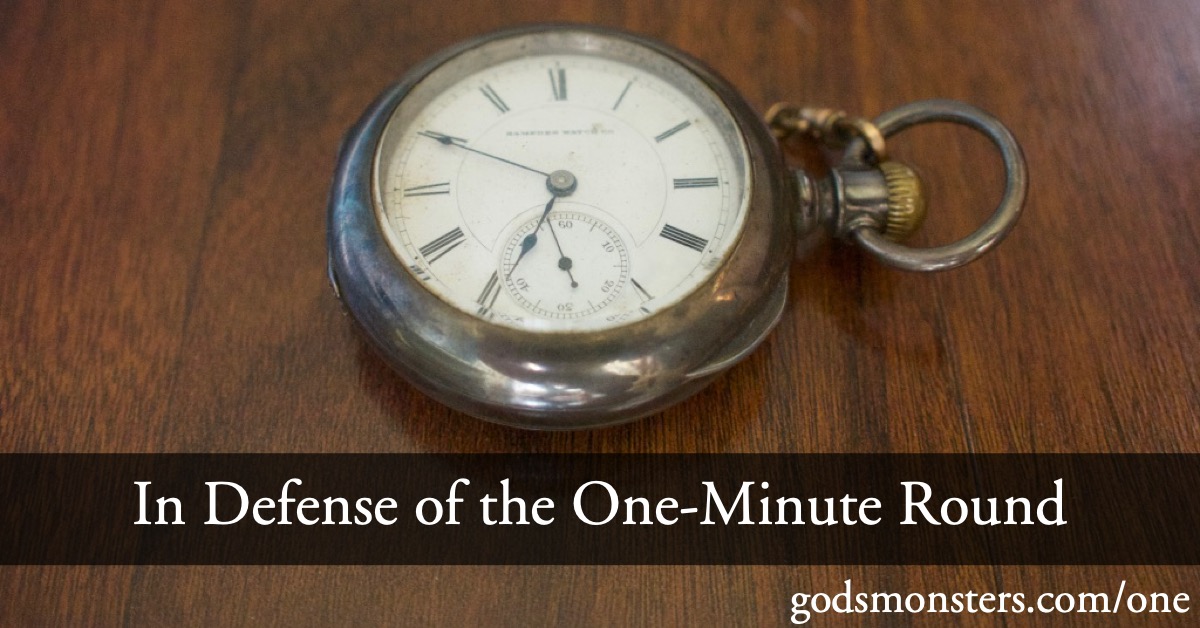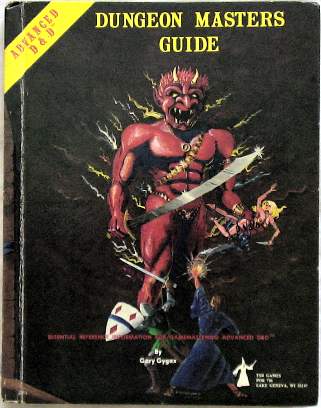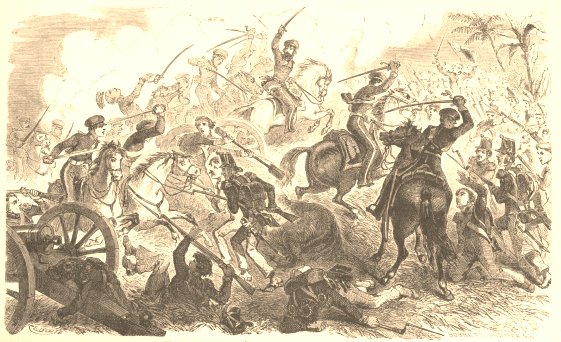In Defense of the One-Minute Round

Tomorrow is Gary Gygax’s birthday. One of the more controversial choices he made for AD&D is the one-minute round. Very few games have such a long round; when I wrote Gods & Monsters, I shortened the round to a mere ten seconds, and even that’s considered a long duration for combat rounds today.
D&D 5E has a six-second round, and the more I play 5E the more I see the benefits of the one-minute round for game play. The most recent example: during our last game, as I write this, I was playing a monk, with shadow step and acrobatics; we were being attacked by a dragon, in a forest, while on a raised platform, and had very little in the way of ranged weapons. I was attacking the dragon using darts, not a very effective attack mode.
Hoping to get closer to the dragon where a monk can be more effective, I looked around for shadow that the dragon might occasionally fly into; I looked around for vines or branches it might occasionally fly near. All while attacking and defending from a breath-wielding dragon.
It occurred to me later that that’s not reasonably possible in six seconds. This is one of the things Daredevils gets right: Daredevils also uses six-second rounds, and dedicates an entire action type to “Observe”. You can defend yourself while observing, but the most you can do for attack is ready a weapon (makes sense: presumably what you observe caused you to want to prepare a weapon against it) or hip fire a firearm, a weapon far easier to use than the bows and darts of D&D.
And all the talking our group does? Some of it literally takes more than six seconds per participant. A six-second round leaves very little room for role-playing both mighty deeds and inspiring one-liners. It leaves very little room for the intricate maneuvering that AD&D and OD&D inspired1.
It leaves very little room for the players to devise new tactics in the course of a battle. A six-second round is not a group-oriented round. It’s a very egocentric round. You’ve barely got time to handle what’s happening around you, let alone what’s happening around your comrades. Coming up with new ideas, role-playing new goals, those don’t realistically fit into a six-second round at all.
At this point, I think ten seconds is the absolute minimum useful length for a combat round in a D&D-like game, and thirty seconds or more is far more appropriate. One minute is very conducive to roleplaying the round-to-round changes in tactics and goals that player character groups go through. If I were redesigning Gods & Monsters, I’d seriously consider upping the round from ten seconds to twenty or even thirty. I’m very glad I didn’t drop down lower than ten.

“The system assumes much activity during the course of each round…”
In the Dungeon Master’s Guide, Gary Gygax explicitly describes AD&D’s one-minute round as one that assumes a lot of activity:
One-minute rounds are devised to offer the maximum of choice with a minimum of complication… The system assumes much activity during the course of each round… The opponents spar and move, seeking the opportunity to engage when an opening in the enemy’s guard presents itself.
The actions players might have their characters take in a round are:
- Avoid engagement (flee, slam door, use magic to escape, etc.) if possible.
- Attempt to parley.
- Await action by other party.
- Discharge missiles or magical device attacks or cast spells or turn undead.
- Close to striking range, or charge.
- Set weapons against possible opponent charge.
- Strike blows with weapons, to kill or subdue.
- Grapple or hold
The D&D 5E PHB describes the round this way:
On your turn, you can move a distance up to your speed and take one action. You decide whether to move first or take your action first. Your speed—sometimes called your walking speed—is noted on your character sheet.
Actions other than predefined actions such as attacking and movement (which are limited to Attack, Cast a Spell, Dash, Disengage, Dodge, Help, Hide, Ready, Search, Use an Object) are described as “a variety of flourishes…”
You can communicate however you are able, through brief utterances and gestures, as you take your turn.
Not a whole lot of talking going on. Certainly no attempts at parley, which, judging by its omission from that list, is no longer a part of combat. A combat round is no longer a place where there is “much activity”. In only six seconds, there can’t be much activity. D&D 5E is very much like Daredevils in this way: because it uses six-second rounds, actions are more easily limited to actions defined by the system. Any weird idea that would take longer than six seconds must happen outside of the rest of the game.

Even just disengaging from this is going to take longer than six seconds…
What my character was trying to do that got me thinking about this issue was the action Search, which is to say, look for one thing (shadow), and then for another thing (vines/branches). It was probably against the rules. At best, a quick search might count as the one object/creature interaction that comes free, although there is no form of looking around listed in the “Interacting with Objects Around You” table. Two quick searches is unlikely to be a free flourish. More likely, even the one search sounds more like the dedicated Search action, where “you devote your attention to finding something.”
The big loss, however, is player and character interaction. Next time you’re at the table, start observing how much talking you and your companions do per round of combat. How much stuff you do besides attack and defend. I think you’ll find that, if it’s a fun game, you’re cramming a whole lot of stuff into a round that literally cannot fit in six seconds.
Start counting up only how much time is taken up by talking. If your game is anything like ours, you’ll find that some individual players spend more than six seconds communicating with the rest of the group. Add up all the time spent talking by every player and a one-minute round starts to make a lot more sense than six seconds.
This is not a matter of old AD&D players ignoring the six second round. None of this group, including the DM, has played previous versions of D&D except me. All that means is that I’m the one who notices it: we’re all naturally assuming that a round needs to be far longer than six seconds for a good game.
I am not someone who argues for realism, but I do argue for suspension of disbelief. Six second rounds make that a lot more difficult than do one-minute rounds given the kinds of things that players will do during a round regardless of how long the round is. My experience is that regardless of what the rules say, there’s going to be talking and even discussion. The one-minute round accommodates this; the six-second round decidedly does not.
Whether it’s the kind of banter among comrades as well as between opponents that happens in comic books, or the kind of negotiations that happen in combat during swashbuckling, or even the tactical planning that happens in major skirmishes, one minute rounds encourage that kind of fun roleplaying where six-second rounds discourage it. I think that kind of play is worth encouraging. It makes the game more fun as a game, and it makes it more of a game of roleplaying.
There is some question about whether OD&D has one-minute rounds or six-second rounds. I think it highly unlikely that AD&D added one-minute rounds. It inherited them from OD&D. The ten second combat round that Basic D&D ended up with almost certainly came as something new, imported from other games and alternate rules.
↑
- 10 second rounds at Dragonsfoot
- “efnisien surmised correctly about a non-TSR source. The 10-sec combat round appears in the Warlock supplement, published as most of the Spartan journal #9 in August 1975.”
- Daredevils Detailed Action Time and Action Options Cube
- The Fantasy Games Unlimited game Daredevils, from 1982, has a very interesting combat turn system. Plus, an Action-Option cube you can assemble yourself!
- Dungeon Master’s Guide
- “After more than two years since tantalizing players with the AD&D Monster Manual, Gygax finished work on his most impressive project, the Dungeon Masters Guide. Oft-criticized for its complicated rules and wordiness, the DM’s Guide nevertheless has held up remarkably well over time, and is an impressive milestone in role-playing-game history.”
- Gods & Monsters
- Explore!
- Length of a Combat Round
- “I find that it's easier not to pin myself down to a specifc time frame. Then I don't have to work out the mathematics.”
- Turns and Rounds in OD&D at Dragonsfoot
- “Gary Gygax wrote an article in issue #15 of The Dragon that tried to explain and clarify all of this… combat round = 1 minute (i.e. 10 rounds per turn)”
More Dungeons & Dragons
- Critical (fantasy) race theory
- It isn’t racist to address D&D characters by their race. D&D character races are things the character can do. It is racist to imply that real world races are as inferior and superior as fantasy races. Woke racism is still racism.
- Watches in Dungeons and Dragons Fifth Edition
- Watches are actually a bit difficult in D&D 5e due to the sleep/rest rules. Watches with multiple people on each watch, for twice the eyes on target, are even more difficult.
- Surprise and initiative in Advanced Dungeons & Dragons
- For the North Texas Role-Playing Game Convention’s tenth anniversary, I ran an AD&D game; the hardest part was re-figuring out how initiative and surprise work.
- The Great Falling War, Revisited
- Delta’s D&D Hotspot revisits the falling wars, and provides a surprising bit of information about the lethality of falling.
- Nothing will be restrained from them, which they imagine to do
- Figuring out stuff from “the times before” is hard to do.
- Six more pages with the topic Dungeons & Dragons, and other related pages
